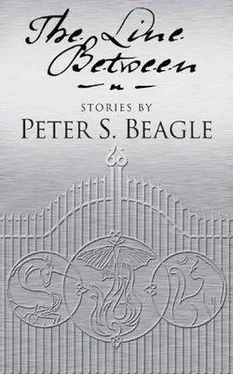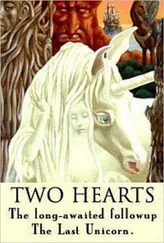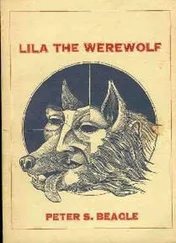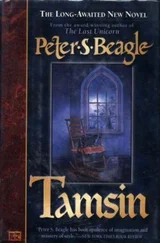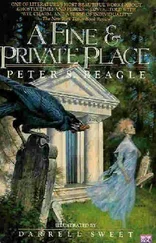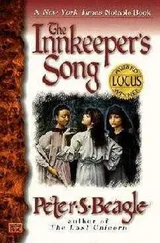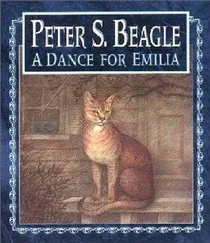Peter Beagle - The Line Between
Здесь есть возможность читать онлайн «Peter Beagle - The Line Between» весь текст электронной книги совершенно бесплатно (целиком полную версию без сокращений). В некоторых случаях можно слушать аудио, скачать через торрент в формате fb2 и присутствует краткое содержание. Жанр: Фэнтези, на английском языке. Описание произведения, (предисловие) а так же отзывы посетителей доступны на портале библиотеки ЛибКат.
- Название:The Line Between
- Автор:
- Жанр:
- Год:неизвестен
- ISBN:нет данных
- Рейтинг книги:5 / 5. Голосов: 1
-
Избранное:Добавить в избранное
- Отзывы:
-
Ваша оценка:
- 100
- 1
- 2
- 3
- 4
- 5
The Line Between: краткое содержание, описание и аннотация
Предлагаем к чтению аннотацию, описание, краткое содержание или предисловие (зависит от того, что написал сам автор книги «The Line Between»). Если вы не нашли необходимую информацию о книге — напишите в комментариях, мы постараемся отыскать её.
The Line Between — читать онлайн бесплатно полную книгу (весь текст) целиком
Ниже представлен текст книги, разбитый по страницам. Система сохранения места последней прочитанной страницы, позволяет с удобством читать онлайн бесплатно книгу «The Line Between», без необходимости каждый раз заново искать на чём Вы остановились. Поставьте закладку, и сможете в любой момент перейти на страницу, на которой закончили чтение.
Интервал:
Закладка:
Just as the ground began to feel somewhat more solid, just as the first lights of the Queen's Road began to glimmer through the thinning vegetation … there they were, there they were, both of them, each standing away at an angle, making me the third point of a murderous triangle. They simply appeared — can you understand? — assembling themselves out of the marsh dawn: weaponless both, their
arms hanging at their sides, loose and unthreatening. One was smiling; one was not — there was no other way to tell them apart. In the dimness, I saw laughter in their eyes, and a weariness such as even I have never imagined, and death.
They let me by. They turned their backs to me and let me pass, fading so completely into the gray sunrise that I was almost willing to believe them visions, savage mirages born of my own fear and exhaustion. But with that combination came a weary understanding of my own. They were playing with me, taking pleasure in allowing me to run loose for a bit, but letting me know that whenever they tired of the game I was theirs, in the dark marshes or on the wide white highway, and not a thing I could do about it. At my age, I am entitled to forget what I forget — terror and triumph alike, grief and the wildest joy alike — and so I have, and well rid of every one of them I am. But that instant, that particular recognition, remains indelible. Some memories do come to live with you for good and all, like wives or husbands.
I went forward. There was nothing else to do. The marshes fell away around me, rapidly giving place to nondescript country, half–ragged, half–way domesticated to give a sort of shoulder to the road. Farmers were already opening their fruit and vegetable stands along that border; merchants' boys from towns further along were bawling their employers' wares to the carters and wagoners; and as I stumbled up, a shukritrainer passed in front of me, holding his arms out, like a scarecrow, for folk to see his sharp–toothed pets scurrying up and down his body, and more of them pouring from each pocket as he strode along. Ragged, scabbed and filthy as I was, not one traveler turned his head as I slipped onto the Queen's Road.
On the one hand, I blessed their unconcern; on the other, that same indifference told me clearly that none of them would raise a finger if they saw me taken, snatched back before their eyes to that place and whatever doom might await me there. Only the collectors at their tollgates might be at all likely to mourn the fate of a potential contributor — and I had nothing for them anyway, which was going to be another problem in a couple of miles. But right then was problem enough for me: friendless on a strange road, utterly vulnerable, utterly without resources, flying — well, trudging — from the only home I had known since the age of nine, and from the small, satisfied assassins it had sent after me. And out of tilgit as well.
The Queen's Road runs straight all the way from Bitava to Fors na' Shachim, but in those days there was a curious sort of elbow: unleveled, ancientry furrowed, a last untamed remnant of the original wagon–road, beginning just before the first tollgate I was to reach. I could see it from a good distance, and made up my mind to dodge away onto it — without any notion of where the path might come out, but with some mad fancy of at once eluding both the killers and the collectors. Sometimes, in those nights when the dreams and memories I cannot always tell apart anymore keep me awake, I try to imagine what my life would have been if I had actually carried my plan through. Different, most likely. Shorter, surely.
Even this early, the road was steadily growing more crowded with traffic, wheeled and afoot, slowing my pace to that of my closest neighbor — which, in this case, happened to be a bullock–cart loaded higher than my head with jejebhai manure. Absolutely the only thing the creatures are good for; we had a pair on the farm where I was a boy — if I ever was, if any of that ever happened. Ignoring the smell, I kept as close to the cart as I could, hoping that it would hide me from the toll–collectors' sight when I struck off onto that odd little bend. My legs were tensing for the first swift, desperate stride, when I heard the voice at my ear, saying only one word, «No.»
A slightly muffled voice, but distinctive — there was a sharpness to it, and a hint of a strange cold amusement, all in a single word. I whirled, saw nothing but the manure cart, determined that I had misheard a driver's grunt, or even a wheel–squeak, and set myself a second time to make my move.
Once again the voice, more insistent now, almost a bark: " No, fool!»
It was not the driver; he never looked at me. I was being addressed — commanded — by the manure pile.
It shifted slightly as I gaped, and I saw the eyes then. They were gray and very bright, with a suggestion of pale yellow far under the grayness. All I could make out of the face in which they were set was a thick white mustache below and brows nearly as heavy above. The man — for it was a human face, I was practically sure — was burrowed as deeply into the jejebhai dung as though he were lolling under the most luxurious of quilts and bolsters on a winter's night. He beckoned me to join him.
I stopped where I was, letting the cart jolt past me. The sharp voice from the manure was clearer this time, and that much more annoyed with me. «Boy, if you have any visions of a life beyond the next five minutes, you will do as I tell you. Now.» The last word was no louder than the others, but it brought me scrambling into that cartload of muck faster than ever I have since lunged into a warm bed, with a woman waiting. The man made room for me with a low, harsh chuckle.
«Lie still, so," he told me. «Lie still, make no smallest row, and we will pass the gate like royalty. And those who follow will watch you pass, and never take your scent. Thank me later — " I had opened my mouth to speak, but he put a rough palm over it, shaking his white head. «Down, down," he whispered, and to my disgust he pushed himself even further into the manure pile, all but vanishing into the darkness and the stench. And I did the same.
He saved my life, in every likelihood, for we left that gate and half a dozen like it behind as we continued our malodorous excursion, while the driver, all unwitting, paid our toll each time. Only with the last barrier safely past did we slide from the cart, tumble to the roadside and such cover as there was, and rise to face each other in daylight. We reeked beyond the telling of it — in honesty, almost beyond the smelling of it, so inured to the odor had our nostrils become. We stank beyond anything but laughter, and that was what we did then, grimacing and howling and
falling down on the dry grass, pointing helplessly at each other and going off again into great, ridiculous whoops of mirth and relief, until we wore ourselves out and could barely breathe, let alone laugh. The old man's laughter was as shrill and cold as the mating cries of shukris, but it was laughter even so.
He was old indeed, now I saw him in daylight, even under a crust of filth and all that still stuck to the filth — straw, twigs, dead spiders, bullock–hair. His own hair and brows were as white as his mustache, and the gray eyes streaked with rheum; yet his cheeks were absurdly pink, like a young girl's cheeks, and he carried himself as straight as any young man. Young as I was myself, and unwise as I was, when I first looked into his eyes, I already knew far better than to trust him. And nonetheless, knowing, I wanted to. He can do that.
«I think we bathe," he said to me. «Before anything else, I do think we bathe.»
«I think so too," I said. «Yes.» He jerked his white head, and we walked away from the Queen's Road, off back into the wild woods.
Читать дальшеИнтервал:
Закладка:
Похожие книги на «The Line Between»
Представляем Вашему вниманию похожие книги на «The Line Between» списком для выбора. Мы отобрали схожую по названию и смыслу литературу в надежде предоставить читателям больше вариантов отыскать новые, интересные, ещё непрочитанные произведения.
Обсуждение, отзывы о книге «The Line Between» и просто собственные мнения читателей. Оставьте ваши комментарии, напишите, что Вы думаете о произведении, его смысле или главных героях. Укажите что конкретно понравилось, а что нет, и почему Вы так считаете.
